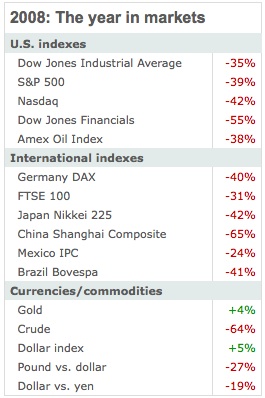This week, I attended an interesting panel at NY Public Library called “Can the Economy be Saved”. Moderated by Charlie Rose, Tuesday night’s program was entertaining as Jeffrey Sachs (Harvard economist) sat side by side with my favorite bubble market antagonist, Nouriel Roubini (his daily RGE Monitor a “must read”) and the investment banking legend Felix Rohatyn.
The three gents outlined in very broad strokes “what happened” over the last few years and why the economy is in such a fragile state.
Roubini, mirroring his daily opinion pieces, suggested:
– the country is bankrupt (senseless war, over spending, not collecting enough taxes, no savings rate)
– housing will fall another 15%
– the asset bubbles were created by the Fed over the past 10 years (possibly politically motivated) and that the Fed needs a new ideology (its okay to have a recession or a normal business cycle and that we cant keep reflating assets to avoid any downturn)
– we should ask China for a $5 trillion loan (tongue in cheek)
– the Fed will need to inject ANOTHER $700 billion into the financial sector to avoid complete meltdown
– the country needs to raise taxes (we have come under the spell over the last 20 years since the Reagan era, that as citizens, we dont have to pay for anything and taxes are bad)
– suggested we need to spend on infrastructure and actually create jobs (vs inflate asset values as a means of creating wealth via low interest rates and “easy money”)
Felix was a bit more vague in his recommendations, preferring not to comment on the question “did Greenspan create this mess” (which the other two quickly stated a loud YES). Felix suggested the country needs to bite the bullet, raise taxes and create jobs and decide which industries to save (autos was his example).
Jeffrey Sachs, ever the liberal professor, spent a majority of the time weaving politics into his answers and raised the spectre that part of the current problem is a “crisis of confidence” and that only by electing a new regime via Obama, can the country have hope and begin the road to repair. He also hit on the same veins from the past several years (his opinion pieces in the Economist for example) that we should move to a more socialist, caring state, similar to Sweden or Norway. Create more equality through income distribution and provide a net for those not able to afford health care.
I found these two additional comments interesting as well:
– Jeffrey and Nouriel both agreed that non G-7 countries and their underlying investible assets are going to take a giant hit since all the G-7 countries basically outlined they will do anything it takes to save their banking sector. Thus, the US Fed should provide a backstop to BRICs, Korea, etc to prevent a massive global run on non G-7 banks, markets, etc.
– The next president should meet with 50 countries in his first 100 days and create a global economic response to the current financial problem. The IMF is too slow and the US doesnt have the money to throw a life line. Ask asian countries (ie China) to support the emerging markets with financial funds in the billions/trillions. If emerging markets retract in a sizeable fashion, demand will decrease for G-7 exports and non G-7 exports, creating a mutiplyer effect and a spirling downward result.








